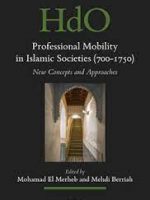Publicaciones

“The Aqīt household: professional mobility of a Berber learned elite in premodern West Africa”, en Berriah, M., y El-Merheb, M., (eds.), Professional Mobility in Islamic Societies (700-1750): New Concepts and Approaches
Berriah, M., y El-Merheb, M https://doi.org/10.1163/9789004467637_005
Tipo de publicación: Artículo
Editorial / Institución editora: Leiden: Brill, 2021.
Abstract:
This chapter addresses the social and geographic mobility of West African ʿulamāʾ in the 10th/16th–11th/17th centuries by analyzing the biographies of sūdānī scholars made by Aḥmad Bābā al-Tinbuktī (d. 1036/1627) and other contemporary sources from premodern bilād al-sūdān. Although all the available textual evidence is clearly self-centered, focusing almost exclusively on Timbuktu, in the case of the Timbuktu Chronicles, and on the author’s own household, in the case of Aḥmad Bābā’s tarājim, it permits to catch a glimpse at both aspects of the intellectual life of the region. Aḥmad Bābā’s household, the Aqīt clan, appears as paradigmatic of social mobility through specialized scholarship. The central role of Egypt (Cairo) as a center of learning for the sūdānī learned elites in this period will also be analyzed, to the detriment of North Africa. Finally, a special remark will be made on the author’s reflections on the political leadership of the ʿulamāʾ, which could be interpreted in terms of the self-consciousness of the Ṣanhāja trading elites in a context of lack of regional authoritative power, that of the decay of the Songhay Empire.
